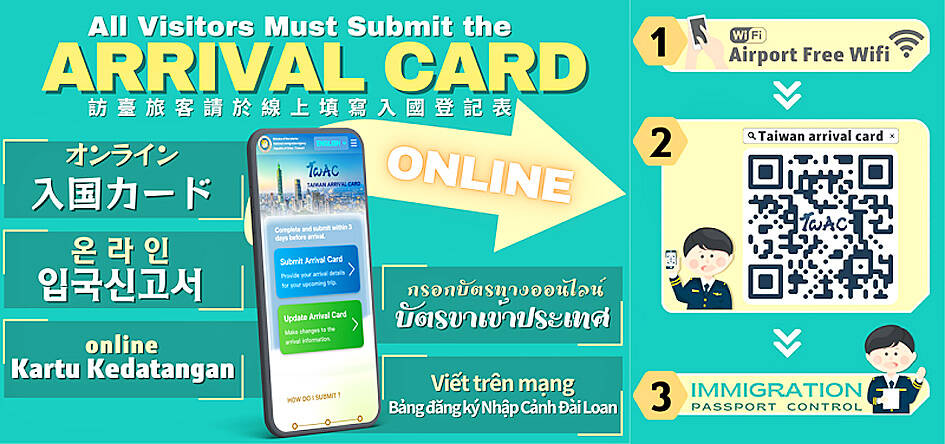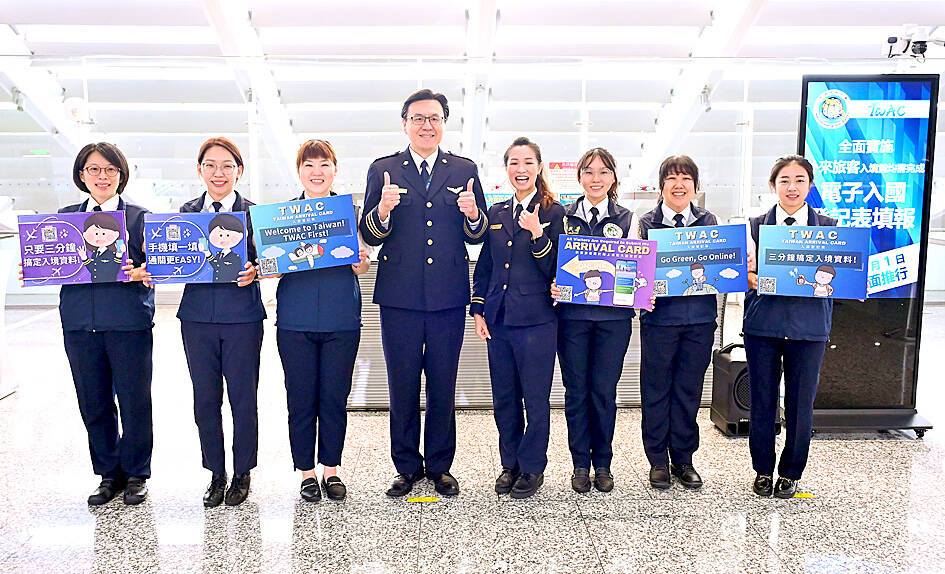Starting on Oct. 1, foreign nationals visiting Taiwan have to fill out an online arrival card three days before entering the nation’s borders, as paper forms are being phased out, the National Immigration Agency announced yesterday.
The policy would expedite foreigners’ passage through immigration while reducing waste, the agency said.
Introduced on May 5, the online arrival card, whose format aligns with international trends, has been well-received, it said.

Photo courtesy of the National Immigration Agency
The arrival card is available in Chinese, English, Japanese, Korean, Thai, Vietnamese and Indonesian, it said.
Travelers can opt to upload a basic information page from their passport, which the system would reference, reducing the time needed to complete the form, it added.
One person can fill out forms for up to 16 people, including tour groups or families visiting Taiwan, which further reduces the customs clearance process, the agency said.

Photo: Chu Pei-hsiung, Taipei Times
Immigration officials can access information on the online arrival card once the traveler is standing at the gate awaiting clearance to expedite the process, it said.
Airline companies are to receive QR codes that are to be displayed at airports and harbors, allowing travelers who have not completed their form in advance to scan them, ideally before their passport is checked at immigration, to facilitate the clearance process, it added.
In other developments, Democratic Progressive Party Legislator Hsu Chih-chieh (許智傑) yesterday said that passenger traffic at Kaohsiung International Airport has recovered to 89 percent of the volume before the COVID-19 pandemic.
The figure is higher than that of Taiwan Taoyuan International Airport, which has only reported a 76 percent recovery rate, he said.
There are 33 routes flying from Kaohsiung International Airport this summer, with 362 flights flying out of the airport per week, Hsu said.
Citing Civil Aviation Administration data, he said that Kaohsiung saw 1.8 million travelers passing through the airport from January to April this year, which is about 92 percent of pre-pandemic traveler volume.
With the onset of summer, the airport could return to about 98 percent of pre-pandemic traveler volume, he added.
Commenting on flights to Europe, the US and Australia, Hsu said he had visited United Airlines, which said that it was assessing the possibility of flying from Kaohsiung to San Francisco with a stopover in Tokyo, starting on July 11.
Most trans-Pacific flights from the US to Taiwan usually arrive before 9pm and there should not be a curfew issue, he said.
With the exception of Taiwan Taoyuan International Airport, every other airport in Taiwan has a curfew to prevent noise affecting nearby residents.
Hsu said he is working with airlines to develop new routes to Vietnam, Japan and Malaysia, which would link southern Taiwan to the rest of the world.

Right-wing political scientist Laura Fernandez on Sunday won Costa Rica’s presidential election by a landslide, after promising to crack down on rising violence linked to the cocaine trade. Fernandez’s nearest rival, economist Alvaro Ramos, conceded defeat as results showed the ruling party far exceeding the threshold of 40 percent needed to avoid a runoff. With 94 percent of polling stations counted, the political heir of outgoing Costa Rican President Rodrigo Chaves had captured 48.3 percent of the vote compared with Ramos’ 33.4 percent, the Supreme Electoral Tribunal said. As soon as the first results were announced, members of Fernandez’s Sovereign People’s Party

MORE RESPONSIBILITY: Draftees would be expected to fight alongside professional soldiers, likely requiring the transformation of some training brigades into combat units The armed forces are to start incorporating new conscripts into combined arms brigades this year to enhance combat readiness, the Executive Yuan’s latest policy report said. The new policy would affect Taiwanese men entering the military for their compulsory service, which was extended to one year under reforms by then-president Tsai Ing-wen (蔡英文) in 2022. The conscripts would be trained to operate machine guns, uncrewed aerial vehicles, anti-tank guided missile launchers and Stinger air defense systems, the report said, adding that the basic training would be lengthened to eight weeks. After basic training, conscripts would be sorted into infantry battalions that would take

GROWING AMBITIONS: The scale and tempo of the operations show that the Strait has become the core theater for China to expand its security interests, the report said Chinese military aircraft incursions around Taiwan have surged nearly 15-fold over the past five years, according to a report released yesterday by the Democratic Progressive Party’s (DPP) Department of China Affairs. Sorties in the Taiwan Strait were previously irregular, totaling 380 in 2020, but have since evolved into routine operations, the report showed. “This demonstrates that the Taiwan Strait has become both the starting point and testing ground for Beijing’s expansionist ambitions,” it said. Driven by military expansionism, China is systematically pursuing actions aimed at altering the regional “status quo,” the department said, adding that Taiwan represents the most critical link in China’s

‘REALLY PROUD’: Nvidia would not be possible without Taiwan, Huang said, adding that TSMC would be increasing its capacity by 100 percent Nvidia Corp CEO Jensen Huang (黃仁勳) on Saturday praised and lightly cajoled his major Taiwanese suppliers to produce more to help power strong demand for artificial intelligence (AI), capping a visit to the country of his birth, where he has been mobbed by adoring fans at every step. Speaking at an impromptu press conference in the rain outside a Taipei restaurant, where he had hosted suppliers for a “trillion-dollar dinner,” named after the market capitalization of those firms attending, Huang said this would be another good year for business. “TSMC needs to work very hard this year because I need a lot